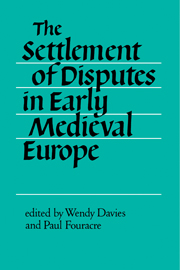Book contents
- Frontmatter
- Contents
- List of figures
- Preface
- Abbreviations
- Introduction
- 1 Disputes in late fifth- and sixth-century Gaul: some problems
- 2 ‘Placita’ and the settlement of disputes in later Merovingian Francia
- 3 Dispute settlement in Carolingian West Francia
- 4 People and places in dispute in ninth-century Brittany
- 5 Visigothic law and regional custom in disputes in early medieval Spain
- 6 Land disputes and their social framework in Lombard–Carolingian Italy, 700–900
- 7 Dispute settlement in the Byzantine provinces in the tenth century
- 8 Charters, law and the settlement of disputes in Anglo-Saxon England
- 9 Dispute settlement in medieval Ireland: a preliminary inquiry
- 10 An early modern postscript: the Sandlaw dispute, 1546
- Conclusion
- Appendix texts of the documents discussed
- Glossary
- List of works cited
- Index
9 - Dispute settlement in medieval Ireland: a preliminary inquiry
Published online by Cambridge University Press: 11 January 2010
- Frontmatter
- Contents
- List of figures
- Preface
- Abbreviations
- Introduction
- 1 Disputes in late fifth- and sixth-century Gaul: some problems
- 2 ‘Placita’ and the settlement of disputes in later Merovingian Francia
- 3 Dispute settlement in Carolingian West Francia
- 4 People and places in dispute in ninth-century Brittany
- 5 Visigothic law and regional custom in disputes in early medieval Spain
- 6 Land disputes and their social framework in Lombard–Carolingian Italy, 700–900
- 7 Dispute settlement in the Byzantine provinces in the tenth century
- 8 Charters, law and the settlement of disputes in Anglo-Saxon England
- 9 Dispute settlement in medieval Ireland: a preliminary inquiry
- 10 An early modern postscript: the Sandlaw dispute, 1546
- Conclusion
- Appendix texts of the documents discussed
- Glossary
- List of works cited
- Index
Summary
Ireland is different in very many ways from the other areas treated in this volume. That is not to say that it was isolated in the middle ages, or that its differences make comparisons an unprofitable study. Far from it – some of the differences are more apparent than real, and arise from the habit of assuming that Ireland is different in all respects, and that its history can be studied without regard to the interests of historians elsewhere. Conversely historians of England and Europe have often been indifferent to matters Irish (or, for that matter, Welsh or Scottish), so that where Carolingians are familiar territory, Uí Néill or Dál Cais have always to be explained. Scholars approaching Irish history and law from philology have devoted more study to archaic aspects of troscad (distraint by ritualized fasting) with its Indian parallels, though it was of very limited significance in the historic period, than to the nature and functions of the airecht, hesitantly translated ‘court’, an institution of central importance to the functioning of law in society. The absence of any corrective interest from historians has allowed this approach to go unchecked. Some refocusing of attention is desirable, away from the search for ‘primitive western institutions’, and on to the operation of the law in seventh- and eighth-century Ireland.
Nonetheless, Ireland is different from continental Europe. In considering procedure for dispute settlement, the two most important differences are these. Ireland lay outside the area of Romanitas as it is relevant to the legal historian.
- Type
- Chapter
- Information
- The Settlement of Disputes in Early Medieval Europe , pp. 169 - 190Publisher: Cambridge University PressPrint publication year: 1986
- 1
- Cited by



